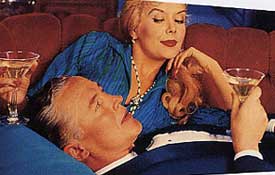This is movie I want
(Sorry, that's an obscure title reference: See Rock Hudson in Winchester 73.)
Are you listening, Hollywood? I'm making a hesitation pitch here:
We need a movie about the Pittsburgh Crawfords in the early 1930s — Satchel Paige, Josh Gibson, Cool Papa Bell, Judy Johnson, Oscar Charleston, Rev Cannady, Willie Gisentaner, the whole lot.
Naturally, as with any historical examination of the Negro Leagues, the temptation will be to tackle head-on the terrible injustice of baseball's color line, the racism these men had to endure, the loss to baseball fans everywhere — and rightly so (how can it be that America learned to split the atom two years before it learned to accept a black ballplayer?). Still, what this movie needs to do is focus primarily on the way these men played baseball, the way they reinvented and re-energized the game.
Baseball fans can read no end of material about Satchel Paige's crazy windups and fireball delivery, or Josh Gibson's thundering power, or Cool Papa Bell's blinding speed, but I want to see it. I want to the see the game played as they played it, beginning to end and top to bottom — with all the heckling and clowning and showboating. I want to see their life on the road as they barnstorm the country.
The inherent injustice behind the Negro Leagues will hang over the story and permeate every frame of the film without any heavy-handed soul searching — so leave it alone and let the story tell itself. Concentrate on the men, the game, and the era (please don't sermonize or eulogize), and you'll get a stronger and more moving story.
And give us detail: Cast someone who can meticulously replicate Paige's contortions on the mound. Get Buck O'Neil to help work out the scripting of the team's antics on and off the field. Focus on the team's colorful numbers-running owner and promoter, Gus Greenlee, and all the after-hours hijinks at Greenlee's Crawford Grill (where Bojangles Robinson performed). For a sense of historical perspective, get Morgan Freeman to do voice-over narration as a 103-year-old Ted “Double Duty” Radcliffe.
And end the movie with a very, very young Jackie Robinson coming on the scene in Kansas City in 1944 — a full decade after Paige, Gibson, and Bell played on the greatest team in Negro League history. These men set the table for Robinson — they're the ones who truly broke the color line. But, as Branch Rickey rightly understood, baseball needed a rookie to actually cross the color line. It wasn't fair, but it was somewhat biblical (see Moses, River Jordan, crossing of).
(And yes, I have seen The Bingo Long Traveling All-Stars & Motor Kings — a fine fictionalized account of the era. Let's do even better this time, huh?)
How does next summer sound for release date? I'll be waiting.
Thanks, Hollywood. I talk a lot of shit, but you know I love you.





1 Comments:
I'll second that!
Post a Comment
<< Home